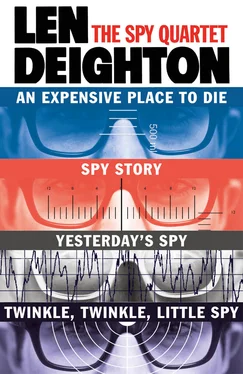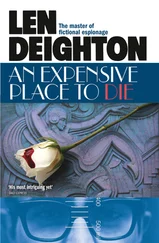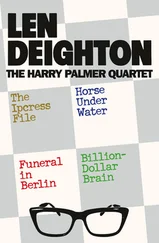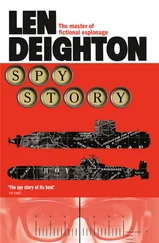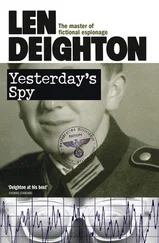Hard work,’ he said.
‘You are going into the cellars?’
‘Not the cellars of Datt’s place,’ Loiseau said to me. ‘We’re punching a hole in these cellars two doors away, then we’ll mousehole through into Datt’s cellars.’
‘Why didn’t you ask these people?’ I pointed at the house behind which the roadwork was going on. ‘Why not just ask them to let you through?’
‘I don’t work that way. As soon as I ask a favour I show my hand. I hate the idea of you knowing what we are doing. I may want to deny it tomorrow.’ He mopped his brow again. ‘In fact I’m damned sure I will be denying it tomorrow.’ Behind him the road-ripper exploded into action and the chiselled dust shone golden in the beams of the big lights, like illustrations for a fairy story, but from the damp soil came that sour aroma of death and bacteria that clings around a bombarded city.
‘Come along,’ said Loiseau. We passed three huge Berliot buses full of policemen. Most were dozing with their képis pulled forward over their eyes; a couple were eating crusty sandwiches and a few were smoking. They didn’t look at us as we passed by. They sat, muscles slack, eyes unseeing and minds unthinking, as experienced combat troops rest between battles.
Loiseau walked towards a fourth bus; the windows were of dark-blue glass and from its coachwork a thick cable curved towards the ground and snaked away into a manhole cover in the road. He ushered me up the steps past a sentry. Inside the bus was a brightly lit command centre. Two policemen sat operating radio and teleprinter links. At the back of the bus a large rack of MAT 49 sub-machine guns was guarded by a man who kept his silver-braided cap on to prove he was an officer.
Loiseau sat down behind a desk, produced a bottle of Calvados and two glasses. He poured a generous measure and pushed one across the desk to me. Loiseau sniffed at his own drink and sipped it tentatively. He drank a mouthful and turned to me. ‘We hit some old pavé just under the surface. The city engineer’s department didn’t know it was there. That’s what slowed us down, otherwise we’d be into the cellars by now, all ready for you.’
‘All ready for me,’ I repeated.
‘Yes,’ said Loiseau. ‘I want you to be the first into the house.’
‘Why?’
‘Lots of reasons. You know the layout there, you know what Datt looks like. You don’t look too much like a cop – especially when you open your mouth – and you can look after yourself. And if something’s going to happen to the first man in I’d rather it wasn’t one of my boys. It takes a long time to train one of my boys.’ He allowed himself a grim little smile.
‘What’s the real reason?’
Loiseau made a motion with the flattened hand. He dropped it between us like a shutter or screen. ‘I want you to make a phone call from inside the house. A clear call for the police that the operator at the Prefecture will enter in the log. We’ll be right behind you, of course, it’s just a matter of keeping the record straight.’
‘Crooked, you mean,’ I said. ‘It’s just a matter of keeping the record crooked.’
‘That depends where you are sitting,’ said Loiseau.
‘From where I’m sitting, I don’t feel much inclined to upset the Prefecture. The Renseignements généraux are there in that building and they include dossiers on us foreigners. When I make that phone call it will be entered on to my file and next time I ask for my carte de séjour they will want to deport me for immoral acts and goodness knows what else. I’ll never get another alien’s permit.’
‘Do what all other foreigners do,’ said Loiseau. ‘Take a second-class return ticket to Brussels every ninety days. There are foreigners who have lived here for twenty years who still do that rather than hang around for five hours at the Prefecture for a carte de séjour .’ He held his flat hand high as though shielding his eyes from the glare of the sun.
‘Very funny,’ I said.
‘Don’t worry,’ Loiseau said. ‘I couldn’t risk your telling the whole Prefecture that the Sûreté had enlisted you for a job.’ He smiled. ‘Just do a good job for me and I’ll make sure you have no trouble with the Prefecture.’
‘Thanks,’ I said. ‘And what if there is someone waiting for me at the other side of the mousehole? What if I have one of Datt’s guard dogs leap at my throat, jaws open wide? What happens then?’
Loiseau sucked his breath in mock terror. He paused. ‘Then you get torn to pieces,’ he said and laughed, and dropped his hand down abruptly like a guillotine.
‘What do you expect to find there?’ I asked. ‘Here you are with dozens of cops and noise and lights – do you think they won’t get nervous in the house?’
‘You think they will?’ Loiseau asked seriously.
‘Some will,’ I told him. ‘At least a few of the most sophisticated ones will suspect that something’s happening.’
‘Sophisticated ones?’
‘Come along, Loiseau,’ I said irritably. ‘There must be quite a lot of people close enough to your department to know the danger signals.’
He nodded and stared at me.
‘So that’s it,’ I said. ‘You were ordered to do it like this. Your department couldn’t issue a warning to its associates but it could at least warn them by handling things noisily.’
‘Darwin called it natural selection,’ said Loiseau. ‘The brightest ones will get away. You can probably guess my reaction, but at least I shall have the place closed down and may catch a few of the less imaginative clients. A little more Calvados.’ He poured it.
I didn’t agree to go, but Loiseau knew I would. The wrong side of Loiseau could be a very uncomfortable place to reside in Paris.
It was another half-hour before they had broken into the cellars under the alley and then it took twenty minutes more to mousehole through into Datt’s house. The final few demolitions had to be done brick by brick with a couple of men from a burglar-alarm company tapping around for wiring.
I had changed into police overalls before going through the final breakthrough. We were standing in the cellar of Datt’s next-door neighbour under the temporary lights that Loiseau’s men had slung out from the electric mains. The bare bulb was close to Loiseau’s face, his skin was wrinkled and grey with brick dust through which little rivers of perspiration were shining bright pink.
‘My assistant will be right behind you as far as you need cover. If the dogs go for you he will use the shotgun, but only if you are in real danger, for it will alert the whole house.’
Loiseau’s assistant nodded at me. His circular spectacle lenses flashed in the light of the bare bulb and reflected in them I could see two tiny Loiseaus and a few hundred glinting bottles of wine that were stacked behind me. He broke the breach of the shotgun and checked the cartridges even though he had only loaded the gun five minutes before.
‘Once you are into the house, give my assistant your overalls. Make sure you are unarmed and have no compromising papers on you, because once we come in you might well be taken into custody with the others and it’s always possible that one of my more zealous officers might search you. So if there’s anything in your pockets that would embarrass you …’
‘There’s a miniaturized radio transmitter inside my denture.’
‘Get rid of it.’
‘It was a joke.’
Loiseau grunted and said, ‘The switchboard at the Prefecture is being held open from now on’ – he checked his watch to be sure he was telling the truth – ‘so you’ll get through very quickly.’
‘You told the Prefecture?’ I asked. I knew that there was bitter rivalry between the two departments. It seemed unlikely that Loiseau would have confided in them.
Читать дальше
